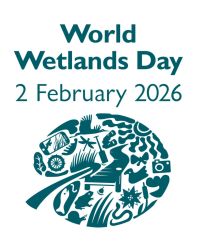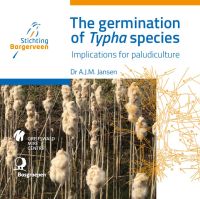News
2026
World Wetlands Day
by Berit Krondorf (comments: 0)
Series of Excursions launching

2 February 2026 To mark International Wetlands Day on 2 February, the Greifswald Moor Centre is announcing a new series of events: ‘A Year in Peatlands’. Every month, an excursion will give interested parties the opportunity to explore the diverse peatland landscape in and around Greifswald and in Vorpommern.
In summer, participants can experience individual topics such as biodiversity, history of use and paludiculture in the field. In the winter months, participants can keep warm while working or sit in the cosy peatland library.
Here are the upcoming dates:
On 7 February, it's time to get stuck in at Mannhagen Moor. Together, we will clear young trees from the peatland to protect rare species. Hot soup will be provided during the lunch break.
On 16 March, the excursion will take us to the ‘treasure on the coast’, the Drammendorf polder on Rügen, with lots of information about renaturation and current research in this coastal peatland.
On 25 April, we will see whether peatland protection and use can be combined. The Bargischow Süd polder is being converted to wet cultivation (paludiculture).
On 9 May, we will experience the sound of a coastal flood peatland while observing breeding birds on the Karrendorfer Wiesen. In addition to fascinating bird calls, participants will learn all about the history of use and nature conservation measures in the area.
Whether natural, utilised, degraded or rewetted – the excursions take place in areas with very different conditions and functions. They are open to anyone interested, are free of charge, but require online registration.
All information here: A Year in Peatlands – Greifswald Moor Centre
Background: World Wetlands Day
Since 1997, World Wetlands Day (WWD) has been held annually on 2 February to raise awareness of the importance of wetlands, including moors. On 2 February 1971, the Ramsar Convention, the international agreement on the protection of wetlands, was adopted. Since 2021, it has been recognised as an international day by the United Nations. Pollution, drainage and agriculture, fires and overfishing have threatened or already destroyed wetlands, including moors, worldwide. Yet they are guarantors of biodiversity and climate protection. Among other things, they offer people protection against drought and flooding, purify water and regulate the microclimate. In Germany, 95% of the former moors have been drained and are no longer recognisable as such today.
How does Typha germinate?
by Berit Krondorf (comments: 0)
New brochure

27/01/2026 Andre Jansen set to find how Typa germinates and what it means for the future of paludiculture – a climate-smart way of farming on rewetted peatlands. Because wet agriculture can help to protect peatlands while still producing valuable biomass!
The result: the brochure "The germination of Typha species" now available online! Based on an extensive literature review, it translates ecological knowledge into practical insights for sustainable land use and restoration.
Five key takeaways:
1️⃣ Typha species produce enormous amounts of viable seeds, making sowing a promising and cost-effective alternative to planting.
2️⃣ Water regime is the key driver: fluctuating water levels strongly influence germination and seedling establishment.
3️⃣ Typha seeds germinate fast and reliably under the right conditions, especially with sufficient light and temperature.
4️⃣ The species’ ability to form persistent seed banks allows rapid colonisation after rewetting events.
5️⃣ Understanding germination ecology is essential for successful paludiculture and peatland conservation.
📖 Discover more in the full brochure here.
Peatland-PV could do much better
by Berit Krondorf (comments: 0)
if it was wet
06/01/2026 Good measure, wrong spot: More GHG emitted than saved by sustainable energy – that’s how the greenhouse gas balance on solar power on drained peatlands in Germany looks like so far, this new study in Scientific Reports of @springernature shows:
https://www.nature.com/articles/s41598-025-27952-4
Instead, this could be far better, and solar-PV on peatlands even greener, if … they were wet! Rewetting stops CO2-emissions from drained peatlands nearly immediately and thus prevents harm from continued peat oxidation exceeding the benefit of a clean energy production.
“Newly wet peatlands with suitably designed solar parks could have a combined benefit and can unlock a powerful climate mitigation potential.” says co-author Carl Pump of the University of Greifswald. “But only with smart and careful planning - ideally in cooperation with all relevant stakeholders and authorities.”
165 solar parks have already been built on peatland until December 2023 with a total installed capacity of 643 MWp. In average they provide electricity for 200.000 households per year. Due to generally lower soils scores peatland areas might even have been favoured in the past. A substantial number of these plants receives feed-in tariff. Since 2023 it has been prohibited to receive feed-in tariff for new solar parks built on drained peatlands, making them largely unprofitable.
The study’s key messages:
- No new solar parks on drained peatlands!
- Peatland PV on rewetted soils can substantially contribute to energy transition!
- Through the additional rewetting of the peatland next to the PV, the emission values of a kWh can be even more positive.
-Rewetted peatland PV could also be part of landuse transition to rewet peatland











